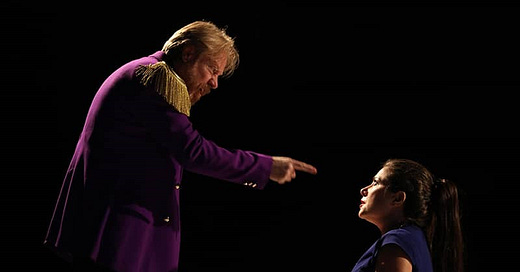Iphigenia (in Aulis)
Daddy Issue par excellence -- İBB City Theatre, 13.11.2024, Müze Gazhane Prof. Dr. Sevda Şener Sahnesi (Istanbul)
Basic Info
Author: Euripides
Year Written: 405-406 BC
Date, Place Seen: 13.11.2024, Müze Gazhane Prof. Dr. Sevda Şener Sahnesi (Istanbul)
I saw this play for the first time. It is not an easy ask - watching the negotiations of a family / society whether to sacrifice a daughter at an altar or not.
For this Turkish staging, I think they had a wonderful production idea to project interview moments - intermittently - with women of different ages and backgrounds. We do not hear the questions being posed but only the answers. So it starts with a lovely, bright tone about how special their father is to them, and how important his support / presence. This first couple of questions appear on the bright side, as one would admit to a stranger only the good things about their family. However, as the play continues and we hear from answers, the statements start to point to a more resentful, troubled relationship between the daughter and the father - as the play moves closer to sacrificing Iphigenia at the altar to Artemis. And I shall point out that the interviews do not seem fictional at all - these women are reflecting on their actual relationship with the fathers - and in quite an emotional way. I can only call it a “broken” feeling, feeling somehow being let-down
And the second thing about the Turkish staging was that all three main actors - Father, Mother, Daughter - came out of their characters and told stories of their relationships with certain animals - as they are - as the stories took place in different parts of Turkey. It is funny that I saw this play only six months ago but have difficulty recalling the animal stories in detail.
Both the video and story non-fictional interjections to this classical play somehow did make it work its way to the audience more easily.
This play is at the intersection of so many things - apart from its main theme. Just going to list some important points;
Timeline: This is just before Trojan War and after Helen is taken to Troy, leaving behind a mad husband, Menelaus who is Agamemnon’s brother. (The reason for sacrifice is being made to receive favorable winds for Greeks’ ships at Argos to sail to Troy)
Playwright’s timeline: Times of despair for Athens since they’ve lost the Peloponnesian war against Spartans. So this is pretty much the end of greek democracy, and time for Macedonian conquests. (There are interesting articles comparing US vs. China as Sparta vs. Athens on the internet - based on Thucydides’ Trap (Graham Allison) Not going into that here, but check it out.
The ending: It is particularly vague, but the myth suggests a deer being replaced at the altar and Iphigenia saved by Artemis. The myth suggests that because the next adventure for Iphigenia is in Tauris (Crimean Penninsula) - Actually Euripides first wrote “in Tauris” and couple of years later “in Aulis” in reverse order.
Characters: Achilles is the potential groom to Iphigenia, but that does not come to pass, he does have his role in this events. The core family goes like this (using LLM for this sort of compilations, they do work)
Atreus (grandfather): Fed his brother Thyestes’ children to him, cursing the family.
Agamemnon: Son of Atreus; king of Mycenae; sacrifices Iphigenia.
Clytemnestra: Agamemnon’s wife; murders him for killing Iphigenia.
Iphigenia: Daughter of Agamemnon and Clytemnestra; nearly sacrificed at Aulis.
Orestes: Son of Agamemnon; avenges his father by killing Clytemnestra.
Electra: Daughter of Agamemnon; aids Orestes in revenge.
“Key Theme: Each act of vengeance spawns new violence, until divine intervention (Athena in Eumenides) breaks the cycle.”
“Killing of the Sacred Deer”: Lathimos’s film’s (2017) title is referring to this play’s final scene where Iphigenia is replaced with a deer by Artemis.




